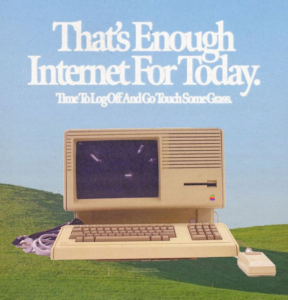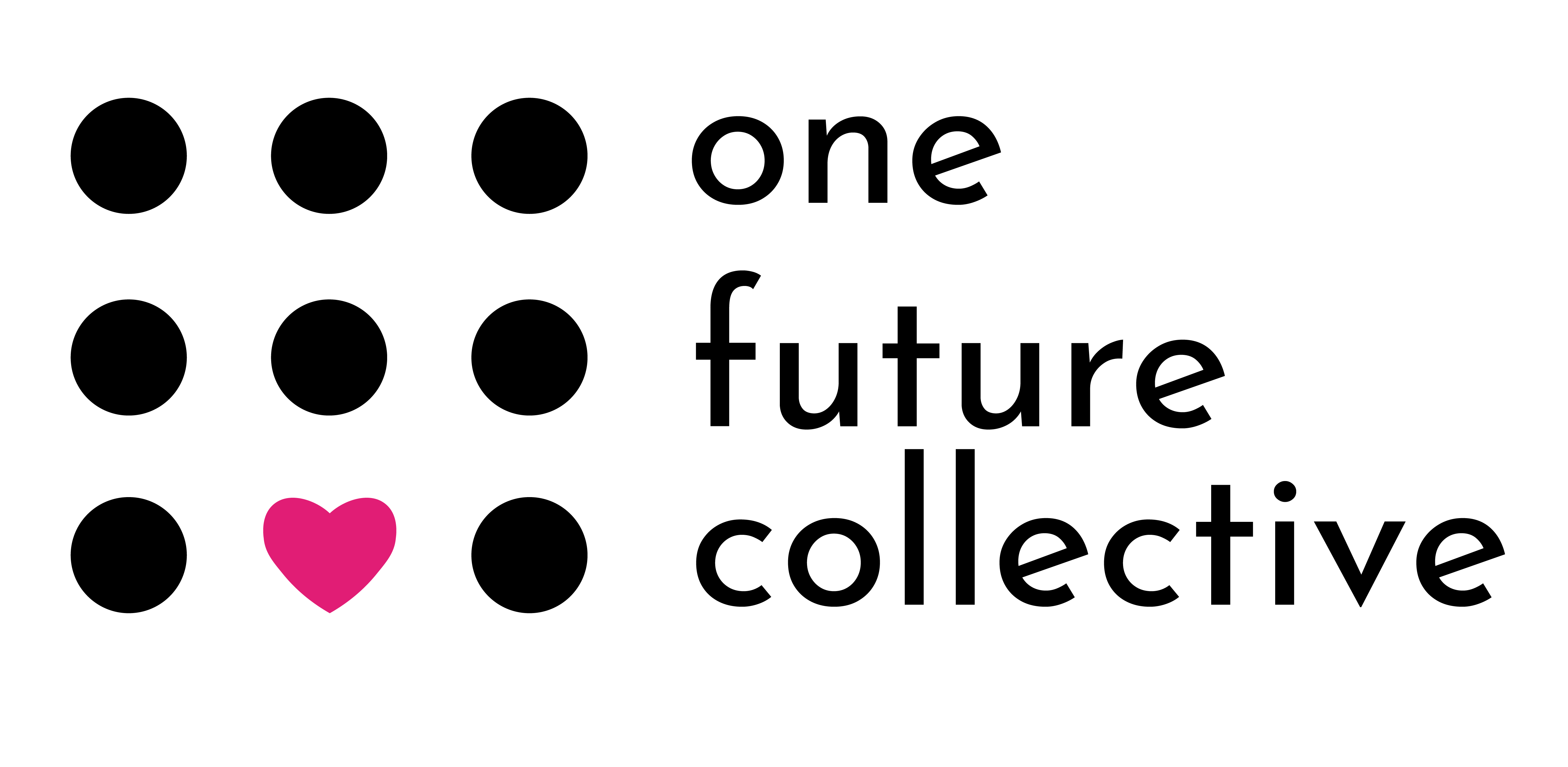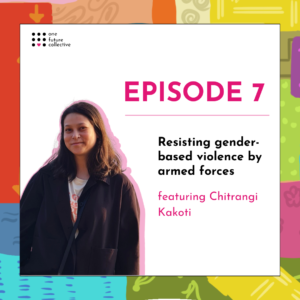Through this fresh episode of Uncuff India, we attempt to understand the differential impact of armed violence on women and the impunity state forces enjoy. Through real-life examples from the Indian context, our magnetic guest, Chitrangi Kakoti, talks us through the multi-layered impact of armed violence on women, its consequent intergenerational trauma and what we can do to preserve memory regarding it. Chitrangi Kakoti has an MSc. in East Asian Relations and an MA in Critical Gender Studies. Her research interests broadly include gender and security studies, feminist social movements, cyberfeminism, and sexuality studies. Currently, she is working as a Senior Program Associate at TARSHI, a Delhi-based NGO.
Transcript
Sanchi
Hello everyone and welcome to our podcast Uncuff India by One Future Collective. My name is Sanchi and my pronouns are she/her.
Uttanshi
My name is Uttanshi, and my pronouns are she and her. We are your hosts today, and it’s so good to have you all listening in. In today’s episode, we will explore the gendered impact of the increasing legitimacy of military violence. Military violence continues to remain a central feature of intrastate law and order, as well as international foreign policy.
Sanchi
Yes, absolutely right, Uttanshi. And as we also know, violence and abuse and the robbing of bodily integrity have become normalized aspects of the lived experiences of women, particularly those in what have been termed “conflict ridden zones”. As a result of this legitimization, women have been reduced to the collateral damage of these conflicts.
Uttanshi
To discuss this and share insights on what can potentially be done to mitigate and resolve this, we have with us Chitrangi Kakoti. Chitrangi has an MSc in East Asian Relations and an MA in Critical Gender Studies. Her research interests broadly include gender and security studies, feminist social movements, hyper feminism and Sexuality Studies. Currently she’s working as a Senior Program Associate at TARSHI, a Delhi-based NGO.
Uttanshi
We’re so excited to have you join us, Chitrangi. It’s really lovely to be learning from you and talking to you about this very important topic.
Chitrangi
Thank you for having me and inviting me on a podcast to talk about such an important topic.
Sanchi
Yes, like Uttanshi said, Chitrangi, we’re very happy to have you with us today and thank you so much for making time to join us for this conversation. We are really looking forward to learning thoughts and I will start us right off and let us begin at the very basics. So, Chitangi, why don’t you tell our listeners if you think that a situation of armed violence impacts women differently and how or how not does this happen?
Chitrangi
Thanks Sanchi for the question. First of all, I’d like to preface our conversation by saying that all thoughts and opinions expressed during our conversation are mine alone and do not reflect TARSHI’s. And thank you for that question. You know, the prevalent belief is that wars and armed conflicts are the realm of men and the masculine, while peace is the realm of the feminine, or that men are active participants during situations of armed violence and women suffer silently in the peripheries. But research by feminist scholars working on conflict and peace studies has shown that the gendered reality of conflict is far more complex. Women and children, especially young girls, are more likely to be killed as civilians. Women and children are also more likely to become displaced and become refugees and find themselves in camps that do not have adequate resources or structures to support them, be it food, shelter, hygiene, safety and so on. Also, during armed conflicts and war, women and young girls are more vulnerable to sexual violence at home. In refugee camps and prisons, in the hands of soldiers and even peacekeeping forces, they are also at risk of being abducted, trafficked and becoming victims of forced and militarized prostitution. Moreover, once the war or conflict is over, survivors are often not welcomed back into their families and communities, as their bodies have been or are perceived as having been violated. So there is a strong connection between war and control of women’s bodies, especially their sexuality and reproduction, due to nationalist scripts of honor and shame that are attached to women’s bodies. So the destruction, and also another point is that the destruction of the natural environment during war due to say a policy of scorched earth or contamination of wells etc. also has gendered impacts because in most communities, especially rural, rural communities, it is often women who grow food, gather fuel, collect water for the household, but, of course, here we must also ask which women? Because women is not a monolithic group and women’s experiences of war and armed conflict are diverse and influenced by a lot of factors such as age, class, caste, race, ethnicity, religion, sexuality and also national identities. So women from marginalized communities are impacted more not just during situations of armed conflict, but also in their everyday lives. Also, another dimension to this is that women also directly participate in wars as competence or participate in and support the military economy. In fact, some feminist scholars in security studies have argued that the state and its militaries rely on women’s labor as nurses, clerical workers, faithful wives, patriotic mothers and sex workers to sustain its war missionaries. So to answer your question, yes, situations of war and armed violence are highly gendered and impact women differently. But we must also keep in mind that one, women’s experiences and the impact of armed violence greatly differ based on the intersections that one is located at. And two, armed and militarized violence is a part of the spectrum or continuum of everyday violence that women experience.
Uttanshi
Thank you for that, Chitrangi. I think a key point that came out for me while I was listening to you was, of course there is a difference in how women, you know, experience these situations. But also an important point about how women as a group is not a homogeneous group and there exists multiple intersections within that group that we need to be extremely mindful of as well. And I wanted to understand from you really, you know, there is a certain sense of impunity that state forces enjoy, that there is a certain level of legitimacy attached to them. What, according to you, encourages this impunity that they enjoy, what, according to you, you know, makes them feel like this is something that if they’re right or that is they can, they can get away with it?
Chitrangi
Well, there are many factors that encourage the impunity that state forces despite like that state forces enjoy despite being perpetrators of violence against women. One is, as I mentioned before, the fact that armed violence lies within a continuum of everyday violence against women and a larger culture of impunity in our patriarchal societies. So you have rhetoric such as the supposed “uncontrollable male libido” that justifies sexual violence and it is the women’s responsibility to protect herself. So you hear similar rhetoric to justify sexual violence perpetrated by armed forces during situations of war and armed conflict as well. Moreover, there’s a culture of excessive and pervasive militarization in a society that glorifies the society and our state forces. And that relies on the citizens of the nation being unquestioningly loyal and obedient to the state in return for protection from external and internal threats which are often manufactured or constructed. So lately in discourses, in public discourses, you have the “Muslim other” against which the Hindu state will offer you protection, or there is an insurgence at the borders of the nation state against whom Indians, Indian citizens must be protected. And, you know, this nature of militarization is supported by so-called special powers that have been given to the army through laws such as the AFSPA order, UAPA. But of course, only certain bodies or lives are worthy of the state’s protection and it is often through women’s bodies that this rhetoric of protection, disciplining and surveillance works, since women’s bodies are the symbolic bearers of ethnonational identity due to their role as the producer of the community or the nation. So sexual violence against women then becomes a tool for punishing, disciplining, and humiliating the enemy or the other even within the nation state and like the impunity, allows state forces to exert power and control over women of communities precisely because of these meanings that are attached to women’s bodies, as the bearer of, you know the honor of the community against whom these state forces are deployed. So yeah, these are some of the reasons why state forces enjoy impunity and the state in fact silences symptoms of violence against women by any means possible. I mean, that’s why despite multiple demands, recommendations and protests to repeal laws such as the AFSPA, like the, these laws continue to be implemented.
Sanchi
Yeah. Thank you so much for bringing up these points Chitrangi and I think it was very interesting how you spoke about how the state tries to meet this rhetoric of protection against the other. And I think what also really stood out to me was when you were talking about this continuum of violence and listening to you, I was just thinking about the generational or the long term impacts that this continuum might have then on women. Would you like to share your thoughts on that?
Chitrangi
Thanks Sanchi. This is an extremely important question, so thanks for asking that. So memory and trauma are embodied, you know, the body remembers. So just to speak from my research, when I was doing research on Korean comfort women under Japan’s military during the Second World War, I read testimony after testimony of the long term impact that the forced militarized prostitution had on the comfort women. So for decades after the end of the war, the women could not speak up about the experiences and they had to suffer in silence because they feared being isolated from their communities or becoming outcasts. In India, we know of incidents of state sanctioned violence against women in conflict zones such as Kashmir or in the Northeast, and these stories have been repressed for decades. We don’t know so many of these stories precisely because survivors, due to the lack of accountability on the part of the state, or even recognition of the of the state, or even recognition of the violence and trauma that their bodies have gone through, often cannot access health facilities in the immediate aftermath of the violence, which leaves long term physical and mental health implications. Survivors also cannot access legal systems to get justice, especially when the violence is state sanctioned and occurs with impunity and armed forces are protected by special laws. Moreover, highly militarized regions of our country are subject to exceptional governance and exceptional laws under which civilians do not have access to justice systems that citizens in the rest of the country have access to. So women therefore have to either suffer in silence or resort to extreme for extreme forms of resistance such as hunger strikes and naked protests where whereby they weaponize and sacrifice their lives and bodies in an effort to get justice. Another point that I’d like to add here is that living in a state of conflict for decades does result in intergenerational trauma due to continuous sexual violence under conflict. Related PTSD and social, social, cultural disruptions, and even the destruction of a lot of these communities in conflict zones. But as I mentioned, unfortunately, due to repression and silence around state violence in conflict zones, our histories and political and legal systems hardly recognize the intergenerational or long term impacts of violence on women.
Uttanshi
You know, Chitrangi, as I was listening to you about these intergenerational impacts of this violence, I’m also thinking are there, you know, in your research and in your, you know, understanding of this theme so far in your study, have you come across instances where there is like how community has probably supported women or like has there been any evidence or any research done on? What helps a situation like this, if there is anything at all, Chitrangi, anything, right? Like what does it look like to be offering support in a situation like this to the survivors themselves as survivors, but also, as you know, bystanders.
Chitrangi
One is that there are organizations, say, like the Human Rights Watch or Amnesty International and other national organizations that work on human rights violations, that do a lot of groundwork in documenting and archiving, you know, these incidents of violence. They also offer legal support to file case courts, sorry, court cases against armed forces. But, as I mentioned, because of the impunity enjoyed by state forces and also because these are state sanctioned, it’s extremely difficult unless and until you have popular support to actually get justice. And so what happens is that it’s often that community members or the women within the community turn to each other for support, I mean, of course now there are, you know, there are more resources, although not as much as one would like for say, psychological support and trauma-informed counselling etc. But again, access to these services for people living in conflict zones continue to be really difficult, often within the community, and also due to the perseverance, dedication and commitment of organizations working in conflict zones where people or women find some form of support. But it’s again like I said as it’s very difficult to access these resources and services.
Sanchi
While you were talking Chitrangi and since we were talking about community and about justice, I was also wondering if you’d like to share with our listeners what does, like in such a situation then, an ideal support system or an ideal community ecosystem look like according to you? And has this also come up in your research or would you like to share thoughts on this?
Chitrangi
My research has not really looked at community support. My research has has looked at resistance against violence on the, yeah, armed conflict. So I would like to dwell upon that in answering your question. I think preserving stories of women’s lived experiences and their resistance against militarism and conflict is very important because they act as counter narratives to nationalist narratives of glorified, you know, militarism. So, again, you need resources and in terms of money and you know, infrastructure to actually build archives, so again, which is very difficult in conflict zones, but you know, there have been stories embedded in our popular discourse about women’s resistance against militarism. So, if I may, I’d like to not share, like just briefly talk about two stories of women’s resistance that have fascinated, intrigued and inspired me since I was a child, which are Irom Sharmila’s 16-year-old, sorry, 16-year-long hunger strike from 2000 to 2016, and the Meira Paibis’ naked protests in front of the Assam Rifles headquarters on July 15, 2004, both of which were protests against the AFSPA in Manipur. In my opinion, both these protests showed how women create an ecosystem of support for one another in order to resist violence or to challenge and even call out the state for sanctioning violence against the communities and the impunity that is offered to the state forces. Yeah, because you see, I mean Meira Paibis, which is a grassroots movement of women in Manipur, they have had a long history of, I mean, it began as a movement to address alcoholism and substance abuse in their communities and violence that is faced by like domestic violence that is faced by women in Manipuri communities, but then it evolved into a movement against the continued presence of the armed forces and the sustained conflict in the state. So yeah, here you see how women support each other in, sorry just a pause. So you see, so you see how women themselves have to create systems of ecosystems of support in absence of support from the state or even, you know, the rest of the country. It’s the support and the counselling and the remembering comes from the members of the community itself.
Uttanshi
Yeah, for sure, Chitrangi. And I think generally we’ve also understood really the value of, you know, preserving memory and preserving the stories and lives of of of such resistance. And I’m sure there are many such such important stories that are yet to be told as well. But thank you so much for sharing the ones that really stood out for you. As we’re approaching the end of this episode, I also wanted to check in with you, Chitrangi, if you have any quick, you know, things that our listeners can do to support and to to resist against such forms of violence. I understand that there is a wide group of listeners, but it will be helpful to understand from you what you think our role could be and what we could do to resist this form of violence and to demonstrate our solidarity with people who face such violence.
Chitrangi
Thank you for that question. That’s a very, I know, difficult question to answer. I think especially in the context of state sponsored violence during conflict because the state is so powerful, right, so how do you even resist it? But I cannot emphasize enough how important it is that we document, archive, and preserve women’s experiences and memories of violence, especially of violence under a state of conflict, because, you know, national histories and archives which build, which build popular discourses, largely do not document women’s experiences. It is important that these stories are embedded in collective memory and that we speak of them over and over and loudly and make them visible so that these memories are preserved and they also make us question and challenge nationalist histories and narratives, as well as the impunity that state forces experience in conflict. It can be as small as you talking to your friends and families and making them aware that you know these stories exist, these memories exist, these experiences exist. Another point that I think is important is that we all carry with us what feminist scholar Cynthia Enloe calls feminist curiosity, so feminist curiosity opens up ways to notice and challenge the insidious ways in which our sociopolitical systems function and maintain power structures. You know, we often do not challenge them or question them and just accept them as they are, so I urge our listeners to always be curious, to question and challenge these so-called traditions, cultures, societies and institutions. Look into the gaps, you know, and the silences. Be curious about them, ask questions about them and lastly, believe in women’s stories and support women’s resistance movements against violence. Yeah, so I’ll stop here and thank you for having me on this series.
Sanchi
Yes, thank you so much for sharing these very important points with us today, Chitrangi. And I think what you shared about counter storytelling, I think that’s that’s so important and I think we, at One Future Collective, also really value that and value the importance of sharing these narratives and sharing them loudly, as you said. And I also think that it’s wonderful that you quoted Cynthia because we’ve had the honor of having her on this very podcast for another episode, so I think it’s a great full circle moment and for all our listeners listening and do keep an eye out for these very interesting episodes then. Thank you so much for making the time to be with us today, Chitrangi. I think we’re taking back a lot of learning and so many things to reflect on and I’m sure that our listeners will absolutely agree with this. Thank you so much for your time.
[Outro begins]
Uttanshi
Thank you for tuning in today. Please leave us any questions you may have as voice notes on Anchor or in our DMS. We would love to hear from you. This podcast is brought to you by One Future Collective.
Sanchi
Yes, thank you so much. And don’t forget to follow us on Instagram and Facebook at One Future Collective and at One Future India on Twitter. And keep an eye out for future episodes, out every second and fourth Thursday of the month. Until next time!
[Outro ends]



